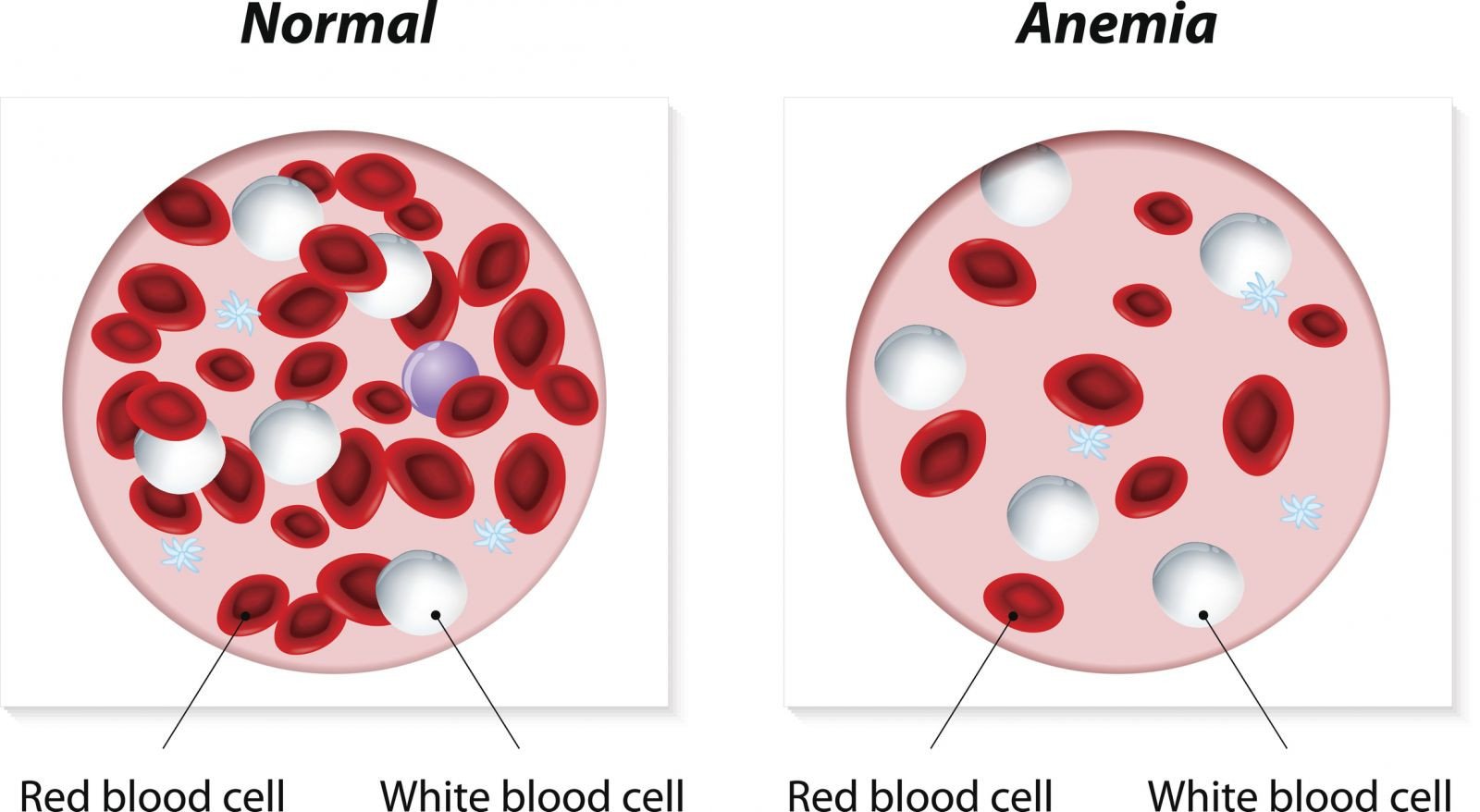Anemia
Medically reviewed by Drugs.com. Last updated on Mar 14, 2025.
What is anemia?

Anemia is an abnormally low level of red blood cells.
|
|
Red blood cells contain hemoglobin. Hemoglobin is a protein that carries oxygen in the blood.
Red blood cells are produced in the bone marrow and then released into the bloodstream. Normally, they live for 110 to 120 days. Older red blood cells are removed from the blood by the spleen and liver.
Anemia can occur when the bone marrow does not produce enough red blood cells to replace those that have died. Or it can occur if the red blood cells die or are destroyed more quickly than usual.
Reasons for under-production of red blood cells by the bone marrow include:
- iron deficiency caused by inadequate intake, blood loss, or poor absorption from the intestine
- vitamin B12 deficiency from either a strict vegetarian diet or an inability to absorb vitamin B12 (known as pernicious anemia)
- some infections, such as parvovirus infection
- chronic diseases, especially inflammatory diseases such as rheumatoid arthritis
- a side effect of some medications, especially chemotherapy
- a disease of the bone marrow, such as aplastic anemia.
When red blood cells are destroyed too quickly, it's known as hemolytic anemia. This can happen when:
- red blood cells have an abnormally short life span
- there is something wrong with the red blood cells
- the red blood cells are normal but are destroyed by an external process.
Causes of hemolytic anemia include:
- inherited abnormalities of red blood cells, such as sickle cell anemia
- physical damage to red blood cells, which can occur, for example, during heart bypass surgery or as the blood flows through artificial heart valves
- autoimmune hemolytic anemia, a condition in which the body's immune system mistakenly destroys its own red blood cells
- an enlarged and overactive spleen (hypersplenism), which can trap circulating red blood cells and destroy them before they are old.
Symptoms of anemia
Symptoms vary widely. Mild cases often don't cause any symptoms. The condition may only be discovered during a routine blood test.
In other people, obvious symptoms of anemia can develop. These include:
- pale skin
- fatigue
- weakness
- dizziness
- lightheadedness
- breathlessness.
Diagnosing anemia
Your doctor will review your medical history. He or she will ask you to describe your symptoms.
During your physical examination, your doctor will look for signs of anemia. These include:
- pale skin and fingernails
- rapid pulse
- heart murmur
- enlarged spleen and liver.
This exam will be followed by blood tests to
- measure the levels of red blood cells
- look at the size and shape of red blood cells
- measure the hemoglobin level
- determine the number of immature red blood cells (the bone marrow may pour out immature blood cells in an effort to make up for the anemia).
Your doctor may also order tests to check for blood in your stool. This can identify whether your anemia is caused by blood loss. Other blood tests check for anemia resulting from a lack of iron or certain vitamins in your diet.
Any other tests you may receive will depend on the suspected cause of your anemia.
Expected duration of anemia
How long anemia lasts depends on its cause and how easily it can be corrected. If the reason for the anemia is only inadequate intake of iron or vitamin B12, the anemia will start to correct within days of treatment.
Anemia caused by an inherited illness is a lifelong condition. Its impact on a person's quality of life and life span can vary greatly, and depends on the specific inherited disorder and its severity. Some people don't have any symptoms. Others have severe, persistent symptoms.
Preventing anemia
Anemia caused by nutritional deficiency can be prevented by eating a healthy diet or taking a vitamin and mineral supplement when iron or B12 intake might be insufficient.
Most other types of anemia cannot be prevented.
Drugs used to treat this and similar conditions
Treatment options
The following list of medications are related to or used in the treatment of this condition.
Treating anemia
Treatment of anemia depends on its severity and cause. Severe anemia may require blood transfusion.
Iron and vitamin B12 deficiency require supplements, which are usually taken by mouth.
Anemia caused by a drug is treated by stopping the drug.
Autoimmune hemolytic anemia is usually treated with drugs called corticosteroids first. Other therapies are added if needed.
Inherited hemolytic anemia may require removal of the spleen (a procedure called splenectomy).
When to call a professional
Call your doctor promptly if you develop symptoms of anemia. Also call if you notice a yellowish tint to your skin or in the whites of your eyes.
If an inherited form of anemia runs in your family, you may wish to consider genetic testing before you start a family.
Prognosis
The outlook for anemia depends on its cause and severity, as well as the underlying health of the affected person.
Cases that are caused by medications or infections usually go away quickly. Anemia caused by chronic diseases tends to be persistent, but is rarely severe.
People with autoimmune hemolytic anemia usually respond well to treatment.
The outlook for people with inherited anemias depends on the type of inherited illness and its severity.
Additional info
National Heart, Lung, and Blood Institute (NHLBI)
www.nhlbi.nih.gov/
Further information
Always consult your healthcare provider to ensure the information displayed on this page applies to your personal circumstances.

